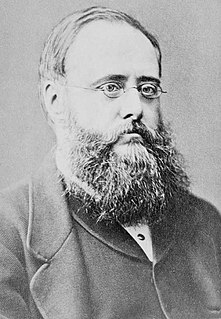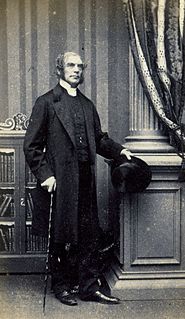A Quote by Emily Dickinson
Till the first friend dies, we think our ecstasy impersonal, but then discover that he was the cup from which we drank it, itself as yet unknown.
Related Quotes
Christ has given us, not only the ritual of an ordinance, but the pattern for our lives, when He took the cup, and gave thanks. So common joys become sacraments, enjoyment becomes worship, and the cup which holds the bitter or the sweet skillfully mingled for our lives becomes the cup of blessing and salvation drank in remembrance of Him.
The first act by virtue of which the State really constitutes itself the representative of the whole of societythe taking possession of the means of production in the name of societythis is, at the same time, its last independent act as a State. State interference in social relations becomes, in one domain after another, superfluous, and then dies out of itself; the government of persons is replaced by the administration of things, and by the conduct of processes of production. The State is not abolished. It dies out.
Eating, drinking, dying - three primary manifestations of the universal and impersonal life. Animals live that impersonal and universal life without knowing its nature. Ordinary people know its nature but don't live it and, if they think seriously about it, refuse to accept it. An enlightened person knows it, lives it, and accepts it completely. He eats, he drinks, and in due course he dies - but he eats with a difference, drinks with a difference, dies with a difference.
What a man can do and suffer is unknown to himself till some occasion presents itself which draws out the hidden power. Just as one sees not in the water of an unruffled pond the fury and roar with which it can dash down a steep rock without injury to itself, or how high it is capable of rising; or as little as one can suspect the latent heat in ice-cold water.
If a friend is the one who summons us to our best, then is not Jesus Christ our best friend, and should we not think of the Communion as one of His chief appeals to us to be our best? The Lord's Supper looks not back to our past with a critical eye, but to our future, with a hopeful one. The Master appeals from what we have been to what we may be. He bids us come, not because we are better than we have been, but because He wants us to be. To stay away because our hearts are cold is to refuse to go to the fire till we are warm.
The woman who first gives life, light, and form to our shadowy conceptions of beauty, fills a void in our spiritual nature that has remained unknown to us till she appeared. Sympathies that lie too deep for words, too deep almost for thoughts, are touched, at such times, by other charms than those which the senses feel and which the resources of expression can realise. The mystery which underlies the beauty of women is never raised above the reach of all expression until it has claimed kindred with the deeper mystery in our own souls.
I remember listening to my first World Cup in 1966. I was with my parents, helping them build our house and listening to it on the radio. We still didn't have a TV back then, but fortunately the first time I listened to a World Cup Jose Maria Munoz was commentating, and he's one of the best there is.
Gradually, at various points in our childhoods, we discover different forms of conviction. There's the rock-hard certainty of personal experience ("I put my finger in the fire and it hurt,"), which is probably the earliest kind we learn. Then there's the logically convincing, which we probably come to first through maths, in the context of Pythagoras's theorem or something similar, and which, if we first encounter it at exactly the right moment, bursts on our minds like sunrise with the whole universe playing a great chord of C Major.
Desire demands only a constant attention to the unknown gravitational field which surrounds us and from which we can recharge ourselves every moment, as if breathing from the atmosphere of possibility itself. A life’s work is not a series of stepping-stones onto which we calmly place our feet, but more like an ocean crossing where there is no path, only a heading, a direction, which, of itself, is in conversation with the elements.






































